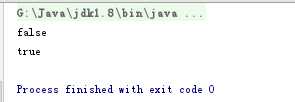为什么Java中1000==1000为false而100==100为true
2021-05-17 12:30
标签:ecif -128 enc sys 结果 required 方法 values rally 我们首先看下面一段代码 运行结果如下 按照我们的理解,如果两个引用指向同一个对象,用==表示它们是相等的。如果两个引用指向不同的对象,==代表不相等的,即使它们的内容相同。 因此,后面一条语句应该也是false。 我们看下Integer.java类,我们会发现有一个内部私有类,IntegerCache.java,它缓存了从-128~127之间的所有的整数对象。 所以我们在声明类似—— 的时候,它实际上在内部做的是—— 我们看下valueOf()方法,可以看到 如果值的范围在-128~127之间,它就从高速缓存返回实例。 所以—— 指向同一个对象,所以输出才会是true。 为什么Java中1000==1000为false而100==100为true 标签:ecif -128 enc sys 结果 required 方法 values rally 原文地址:https://www.cnblogs.com/NullCXY/p/9746495.htmlInteger a = 1000,b=1000;
System.out.println(a==b);
Integer c = 100,d = 100;
System.out.println(c==d);

分析:
Integer c = 100;
Integer i = Integer.valueOf(100);
1 /**
2 * Returns an {@code Integer} instance representing the specified
3 * {@code int} value. If a new {@code Integer} instance is not
4 * required, this method should generally be used in preference to
5 * the constructor {@link #Integer(int)}, as this method is likely
6 * to yield significantly better space and time performance by
7 * caching frequently requested values.
8 *
9 * This method will always cache values in the range -128 to 127,
10 * inclusive, and may cache other values outside of this range.
11 *
12 * @param i an {@code int} value.
13 * @return an {@code Integer} instance representing {@code i}.
14 * @since 1.5
15 */
16 public static Integer valueOf(int i) {
17 if (i >= IntegerCache.low && i IntegerCache.high)
18 return IntegerCache.cache[i + (-IntegerCache.low)];
19 return new Integer(i);
20 }
Integer c = 100,d = 100;
文章标题:为什么Java中1000==1000为false而100==100为true
文章链接:http://soscw.com/index.php/essay/86719.html